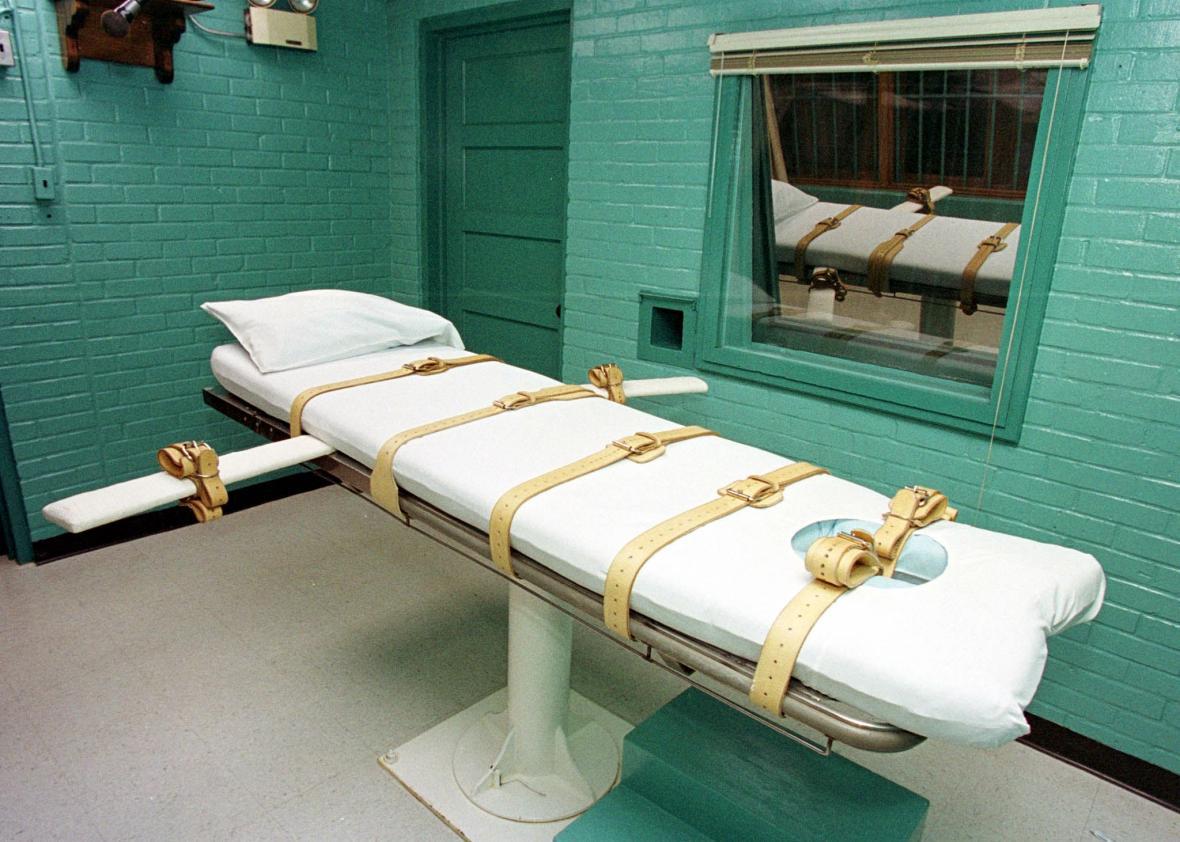Mississippi would very much like to execute Richard Jordan and Ricky Chase. It would also like to keep certain aspects of their executions a secret—specifically, the drugs used to kill them, as well as the suppliers of those drugs. But recent history counsels that when states use secret execution drugs, inmates get tortured to death. So Jordan and Chase subpoenaed Missouri, which currently holds the execution drugs, to find out information about the chemicals that will soon stop their hearts. Missouri has spent months waging a legal battle against the subpoena, so far unsuccessfully. Now the pharmacy that produces the lethal chemicals has joined the fight, arguing in court that it has a First Amendment right to sell execution drugs—anonymously.
As BuzzFeed’s Chris McDaniel and Chris Geidner report, the pharmacy—which uses the pseudonym M7 in court filings—insists that its production and sale of these drugs qualifies as constitutionally protected “political speech.” M7 argues that its “decision to provide lethal chemicals” for execution was based on its “political views on the death penalty, and not based on economic reasons.” In other words, the pharmacy claims that it sells the drugs to express its support of capital punishment; the money is just a bonus. (That’s a curious assertion given that, as McDaniel has reported, the state egregiously overpays M7 for the drugs, paying the pharmacy in cash well above market value—possibly in violation of federal tax law.)
Why, exactly, should the sale of lethal chemicals be protected by the Free Speech Clause of the First Amendment? M7 declares that the sale of these drugs:
is an expression of political views, no different than signing a referendum. Thus, M7’s actions in expressing its views regarding the death penalty through the sale of lethal chemicals, which necessarily involves communications and speech, are protected under the First Amendment.
Moreover, the pharmacy argues, the fact that its “expression of political views involves a commercial transaction does not diminish M7’s First Amendment rights,” because “expressive materials, speech and associations do not lose their First Amendment protection merely because they are offered for sale.” And because the First Amendment protects a speaker’s anonymity when the disclosure of its identity will subject it to “threats, harassment, or reprisals,” M7 claims that Jordan and Chase’s subpoena must be quashed.
There are two reasons why this argument is really, really stupid. The first, lucidly explained by Bloomberg’s Noah Feldman, is that M7 isn’t engaged in any kind of real First Amendment expression. Yes, certain conduct can be sufficiently symbolic to merit free speech protections, and for-profit corporations have a First Amendment right to engage in information-related commercial transactions. But M7 isn’t doing any of that. It’s merely selling a drug to a state for a sizable profit, a quintessential act of commercial conduct rather than an exercise in symbolic expression. As Feldman puts it, M7 cannot “protect its actions from regulation simply by insisting that it is performing them out of political belief.” If it could, then almost any seller could escape regulation by citing some political motivation behind its business—from a drug dealer (“I’m supporting legalization!”) to a coal miner (“I’m opposing Obama’s Clean Power Plan!”).
But there’s a second, even better reason why M7’s argument is so astoundingly moronic: Even if selling execution drugs were an act of constitutionally protected speech, M7 would have absolutely no right to “express” its support of the death penalty anonymously. While there are some very limited circumstances in which the Constitution protects anonymous speech, this is indisputably not one of them. M7 believes otherwise, equating its plight today to the NAACP’s quandary in the 1958 Supreme Court case NAACP v. Alabama. There, Alabama ordered the NAACP to turn over its membership list. The NAACP refused, fearing (correctly) that Alabama was targeting its organization because of its political activity—using disclosure laws to unmask its members, expose them to attacks, and scare them into quitting the group.
The Supreme Court unanimously sided with the NAACP. It reasoned that mandatory disclosure would violate NAACP members’ freedom of association, penalizing their “advocacy of particular beliefs” by opening them up to the “threat of physical coercion.” But the ruling was narrow, protecting anonymity only where groups or speakers require secrecy in order to express themselves without severe reprisals. Since then, the court has stuck with this principle, generally limiting the right to anonymous expression and association to situations in which disclosure would subject individuals to serious harassment or retaliation.
M7 insists that, if unmasked, it will be persecuted much like NAACP members would’ve been persecuted in civil rights-era Alabama. It claims that drug suppliers face real threats of violence for providing execution chemicals, asserting that this history of intimidation proves the pharmacy has a constitutional right to anonymity—just like the NAACP. But as McDaniel explained in August, M7’s claim is bogus: Execution drug providers don’t face violent retaliation or abusive harassment; they just face the kind of boycotts and shaming campaigns that have already persuaded more than 20 major pharmaceutical companies to stop selling execution chemicals.
And that is the ultimate irony—or hypocrisy—of M7’s First Amendment claim. The pharmacy says it is engaging in political speech, when really it wants to avoid the kind of classic political expression that has so effectively driven most execution drugs off the market. M7 doesn’t want to promote free speech; it wants to hide from it. And soon enough, when the courts reject its plea for anonymity, M7 will get to see what good old-fashioned First Amendment speech actually looks like.
